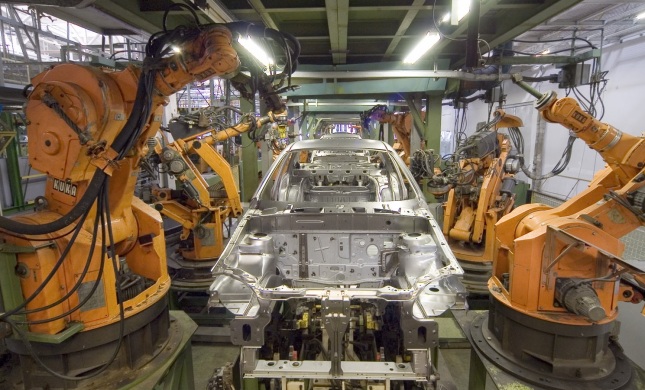Man vs. robot
Angst over robot jobs is picking up steam, writes Peter Nowak
Photo illustration by Taylor Shute
Share
 It’s easy to tell when a new technology has reached critical mass – discussions over its long-term effects start kicking into overdrive. That’s happening now with robots and how they are going to affect the human job market.
It’s easy to tell when a new technology has reached critical mass – discussions over its long-term effects start kicking into overdrive. That’s happening now with robots and how they are going to affect the human job market.
Conventional thinking has always held that automation and robots have historically been good things, because when a machine takes over a task, the human who used to do it is forced to do something smarter and better. This has had traditional repercussions both great and small, from auto assembly line workers necessarily having to upgrade their skills or maybe even start their own businesses, to regular people simply not having to remember minutiae like phone numbers because machines do it for them. Machines have traditionally freed our brains to worry about other, more important stuff.
However, in a recent 60 Minutes interview, MIT professors Erik Brynjolfsson and Bruce Welty raised a worrying issue – that robotic development has now reached the exponential phase, which means that machines are taking over human tasks faster than humans can come up with new and better things to do.
“Right now the pace is accelerating. It’s faster we think than ever before in history,” Brynjolfsson said. “So as a consequence, we are not creating jobs at the same pace that we need to.”
By that estimation, robots will eventually take over all human jobs, leaving us with nothing to do. This is very bad, says the New York Times’ Paul Krugman, because that means all wealth will be controlled by the people who own the robots (assuming the machines don’t turn on us and kill us all, of course):
Smart machines may make higher GDP possible, but also reduce the demand for people — including smart people. So we could be looking at a society that grows ever richer, but in which all the gains in wealth accrue to whoever owns the robots.
Wired writer Kevin Kelly, on the other hand, takes a more optimistic approach when he says that we can’t evenimagine the jobs we’ll create because of this increasing automation. Humans’ role in the future will thus be the same as it is now: to create jobs that only people can do at first, with those tasks eventually falling to machines, whereupon the cycle will keep repeating.
This stuff is exactly the meat of the current chapter I’m working on for Humans 3.0, my upcoming book. I’m more inclined to side with Wired because, if there’s one thing we can be certain of when it comes to the future, it’s that it’s very difficult to imagine. As Kelly puts it:
Before we invented automobiles, air-conditioning, flatscreen video displays, and animated cartoons, no one living in ancient Rome wished they could watch cartoons while riding to Athens in climate-controlled comfort. Two hundred years ago not a single citizen of Shanghai would have told you that they would buy a tiny slab that allowed them to talk to faraway friends before they would buy indoor plumbing. Crafty AIs embedded in first-person-shooter games have given millions of teenage boys the urge, the need, to become professional game designers—a dream that no boy in Victorian times ever had. In a very real way our inventions assign us our jobs. Each successful bit of automation generates new occupations—occupations we would not have fantasized about without the prompting of the automation.
Where Krugman’s thesis falters is in the notion that it’ll somehow be big entities that own the robots. With even children creating their own Lego robots, that’s highly unlikely. Robots are getting better and cheaper, which means that everyone is likely to benefit from the robotic revolution.